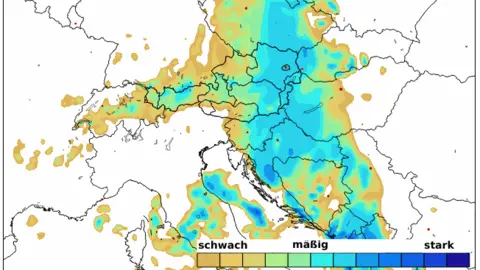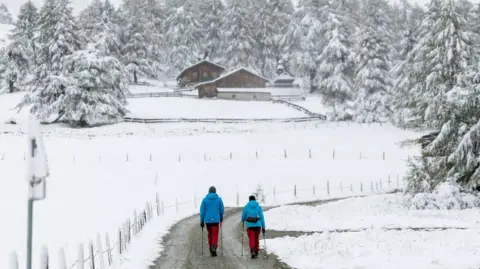ARTICLE AD BOX

 MARTIN DIVISEK/EPA-EFE/REX/Shutterstock
MARTIN DIVISEK/EPA-EFE/REX/Shutterstock
Workers in Prague have been closing floodgates on the River Vltava
Sandbags are being prepared in Austria, reservoirs have been emptied in the Czech Republic and flash floods are expected in Poland, as forecasters warn of days of "potentially catastrophic" rainfall.
Polish Prime Minister Donald Tusk has said there is “no reason to panic”, after attending a flood risk briefing in Wroclaw, amid forecasts of 15cm (6in) of rainfall in four southern provinces.
In Austria, heavy rain and snow in the mountains has already led to travel disruption and Chancellor Karl Nehammer has said the army is ready to deploy up to 1,000 soldiers if necessary.
The Czech capital is taking no chances, after floods that devastated the city two decades ago.
Images from 2002 of flooded metro stations, residents being evacuated in rubber dinghies and elephants drowning in the Prague Zoo are seared into the local memory.
Shortly before 10:00 (08:00 GMT) on Friday, a pair of heavy steel gates, one metre thick, closed off the so-called Devil's Canal or Certovka, a sliver of water that slices through the historic Mala Strana district of Prague before rejoining the River Vltava.
The Certovka gates are part of a nationwide network of flood defences that officials say have cost more than €1bn (£845m) in order to prevent a repeat of the catastrophic damage of 1997 and 2002.
Prague hopes to escape the worst of the flooding. Attention is focused this weekend on central and eastern parts of the country, especially North Moravia, where 50 people lost their lives in 1997.
The Jeseniky mountains could receive some 400mm over the next three days, and that water will then cascade down the River Oder (Odra in Czech) and on towards Poland, passing a number of towns and villages on the way.

 GeoSphere Austria
GeoSphere Austria
The GeoSphere Austria weather map on Friday showed a large band of rain across Central Europe
After attending a briefing by emergency services in south-west Poland, Donald Tusk sought to reassure the public that the forecasts were "not overly alarming" and there was no reason to predict anything on a scale that might cause a threat across the country.
Poland's territorial army was on standby, he said, and in one of the four southern provinces, Malopolska, an estimated two million sandbags had been stockpiled, while another million were available in Lower Silesia, the province around Wroclaw.
“If something can be expected, and this what we want to be prepared for, it is of course localised flooding or so-called flash floods,” he added.
The Polish Institute of Meteorology and Water Management later extended the highest alert level from the four southern provinces to the mouth of the River Odra in Szczecin, where it spills into the Baltic Sea.
Austria experienced its hottest August since records began, according to the Geosphere Austria federal institute.
Now it is warning of 10-20cm of rainfall in many regions in a matter of days. In some places, well over 20cm is possible, especially in the mountains of Upper and Lower Austria and in northern Upper Styria.

 JOHANN GRODER/APA/EXPA/AFP
JOHANN GRODER/APA/EXPA/AFP
Heavy snow has already fallen in Austria's Tyrol
Austrian storm warning centre UWZ says that in some areas, previous records for the entire month of September will be "surpassed in just a few days".
Manuel Kelemen, a forecaster for Puls24 TV, says from a meterological point of view, "what we're experiencing is extraordinary, if not unprecedented".
Railway network OEBB has advised all passengers to postpone non-urgent journeys. Part of the Tauern railway line between Bad Hofgastein and Böckstein in the province of Salzburg has been closed because of heavy snowfall.
Flooding and landslides are possible, with gale force winds expected in the capital, Vienna. Aid organisation Caritas has appealed for volunteers to help in affected areas.
Continuous heavy rain is also expected across the border in the German state of Bavaria.
This is of course a regional, not a national emergency, with a large area of Central Europe affected.
But a reminder of national priorities came earlier this week when Czech officials said they had been forced to refuse a German request to stop emptying reservoirs into the River Vltava, which flows into the River Elbe (Labe in Czech) and onwards to Germany, following the collapse of a bridge in Dresden.
Those reservoirs - a series of nine dams known as the Vltava Cascade - will need to be half-empty to take what this weekend has in store.

 4 months ago
17
4 months ago
17








 English (US) ·
English (US) ·